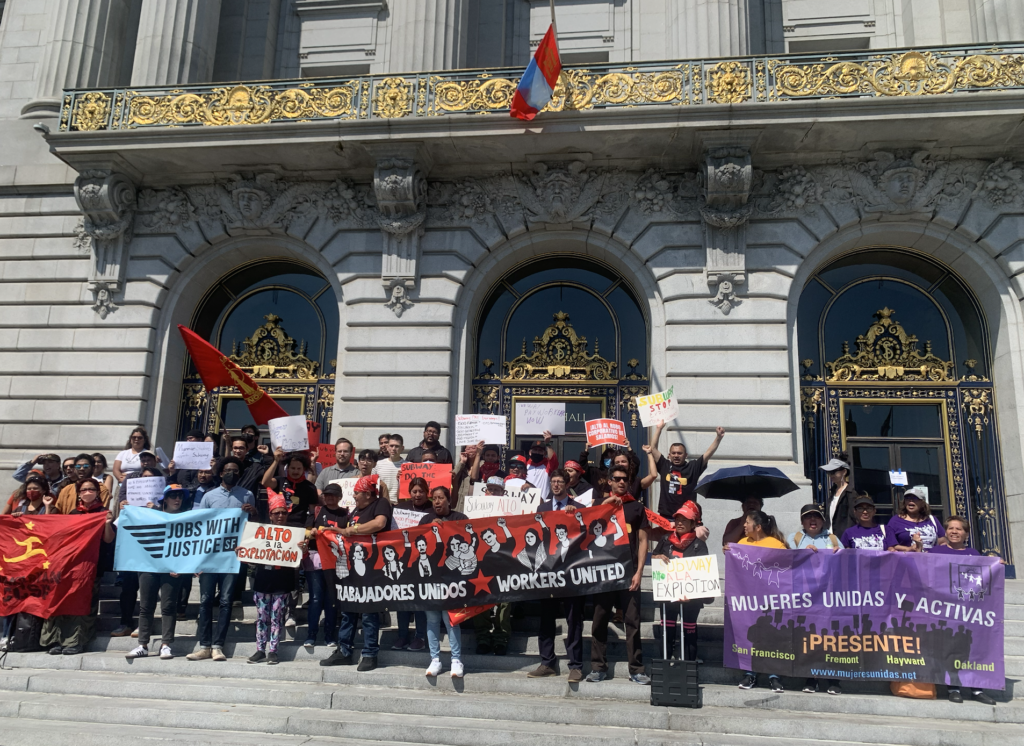On the steps of City Hall Thursday morning, a group of around 50 labor organizers, community activists, and student groups called for an end to alleged wage theft and labor law violations at San Francisco Subway restaurants.
The California Labor Commissioner is currently investigating reports of wage theft at seven San Francisco Subway restaurants, with some workers reportedly being paid as little as $13 an hour, compared to California’s fast-food minimum wage of $20. Further, workers have reported not being granted overtime, sick pay, tip earnings or proper breaks.

The allegations are contained in a July 18, 2023 complaint with the state Labor Commissioner’s Office, which started an investigation into the two Subway franchises that operate seven sandwich restaurants. Supported by Legal Aid at Work and Trabajadores Unidos Workers United , the workers who came forward are primarily recent immigrants, mainly from South Asia and Latin America. For many, working at these Subway locations was their first employment experience in the United States.
“My first job was at Subway,” said Roxana Garcia, a former Subway employee who immigrated to San Francisco from Mexico four years ago. Speaking in Spanish to the crowd, with a TUWU member’s translation, Garcia said she realized that she and her coworkers were facing wage theft on top of a number of other labor violations. Upon the realization, she got connected with TUWU and quit her job.
“It is important that workers raise their voices to say, ‘enough is enough with these exploitations,’” Garcia told the crowd. “I am here today to make a change, to not allow these abuses for other workers who continue to be exploited. We have to break the mental chains, the fears.”
Garcia is one of 10 workers who have come forward in the complaint on behalf of a group of 35. According to Alexx Campbell, senior staff attorney in the Wage Protection Program at Legal Aid at Work, 35 is likely a low estimate of how many people have been affected, due to the number of individuals he said were paid in cash.
In May, the labor commissioner filed two Notices to Discontinue Labor Law Violations to the two Subway franchises. “This is a public document that says ‘we, the state, believe that labor law violations have been or are being committed, and you need to stop now,’” Campbell said.
Subway did not reply immediately for a comment. However, in a statement on the alleged labor violations to NBC last week, a spokesperson from Subway corporate said, “We take these matters very seriously and are looking into the alleged claims. Our restaurants are independently owned and operated, and franchisees are required to follow federal, state and local laws.”
Legal Aid at Work and TUWU are working to get former employees paid for their missing wages. But further than that, these seven restaurants are still fully operational, and some of the workers who came forward are still employed under the same conditions.
“What’s frustrating with this company is that they continue to engage in the same kind of practices,” Campbell said. “So part of what we are also focusing on, in addition to the past wages, we want them to change their practices going forward.”
When Ilsi Rivas, a current Subway employee, moved to San Francisco from Guatemala three years ago, she found a job at Subway. In a speech to the crowd, translated again by a member of TUWU, she said throughout those three years, “I have been exploited without knowing it…I didn’t know how to read a pay stub because everything was in English.”
Once Rivas spoke with her family and began to learn how to read the pay stub, she noticed that it was missing hours of work. In speaking with Subway employees at other San Francisco locations, she began to notice that she was not alone in this treatment.
“I was worried other workers were going through the same things like I was,” she said. “I started asking my coworkers, which was difficult because none of us spoke the same language.”
“A long time ago I wanted to speak up but I was afraid,” Rivas told me, with a TUWU translator, after the rally. Rivas said she is apprehensive of retaliation for speaking out as she currently works at Subway, but she said is “happy because I’m fighting for people’s rights and because I want to see these changes be made sooner.”
“I want workers to not be afraid to speak up when there is injustice in our jobs,” Rivas said to the cheers of the crowd. “We have a right to talk to our colleagues because we know that corporations like Subway are not going to protect us.”[MR1]
Many community supporters attended the rally. Members from the Myanmar Student Union at Skyline Community College came “in solidarity with the workers,” said student Win-Mon Kyi. “We know that there’s Myanmar workers that are coming to San Francisco,” she said. “We need to fight for [their] rights — worker rights, human rights.”
District 5 Supervisor Dean Preston also spoke at the rally. “We, the residents of San Francisco, fought for strong protections for workers, fought for minimum wage and living wage standards, fought at the state level for protections for fast food workers,” he said. “We did not fight for those laws so that it could just be on paper…We do not tolerate wage theft. We do not tolerate the violation of workers’ rights. And this supervisor, and I’m sure others that I serve with, will stand with you in the fight to make sure that you have justice, that your rights are respected.”





